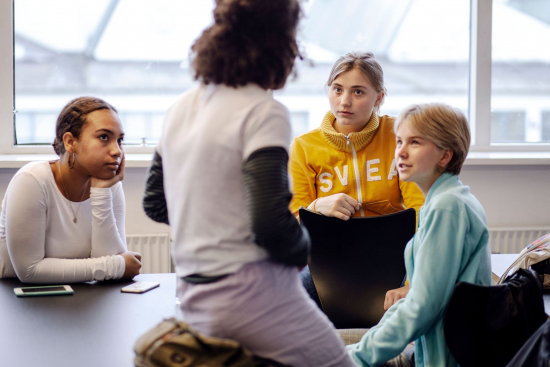The Higher General Examination Programme (STX)
The STX programme is a fulltime three-year general upper secondary education programme which qualifies the holder for admission to Danish business academies, Schools of technology and design, university colleges and universities.
The focus in STX is on general education and general study preparation. The academic standard is closely linked to aspects of the academic subjects, and the students are to achieve general education and study competence in the humanities, natural sciences and social sciences with a goal to being in a position to complete a higher education.
The structure of the programme
Foundation course – 3 months
- Danish, English, Mathematics, Social sciences and subjects from the specialized study programme
- Basic course in general knowledge of languages
- Basic course in natural sciences
Specialized study programme – 2 years, 9 months
- Compulsory subjects and levels
- The two to three subjects constituting the specialized study programme
- Individual project
- Electives
Facts about the STX programme
Compulsory subjects and levels* in the specialized study programme
- Danish A
- English B
- 2nd foreign language B or A (French, German or Spanish advanced B or beginner A, Italian beginner A, Russian beginner A, Chinese beginner A)
- History A
- Classical studies C
- Physics C
- Physical education (PE) C
- Artistic subject C (either visual arts, drama, media studies or music)
- Mathematics B (C-level if the student has 3 foreign languages or more)
- Religion C
- Social sciences C
- At least two of the subjects biology, chemistry or natural geography at C-level.
* A = upper level, B = medium level, C = basic level.
Choice of a specialization
After finishing the foundation course, each student chooses a specialized study programme which consists of a set of two or three subjects supplemented by one or more electives.
Each school must provide a selection of 18 standardized programmes which students can choose from.
In their third year each student writes a project using methods from two different subjects.
Number of weekly periods
In the course of the three years each student completes a minimum of 2600 hours of classes. In addition to classes, the programme includes homework, written assignments, research, etc., as well as examinations. At Rysensteen, the students have an average of 18 lessons of 90 minutes pr. week, with school days lasting from 8.15 AM to 3.25 PM.
Typical work methods
Various methods of teaching are employed, e.g. classroom instruction, project work, individual and group based written work, etc. Up to 20% of the teaching time can be spent on virtually organized teaching.
